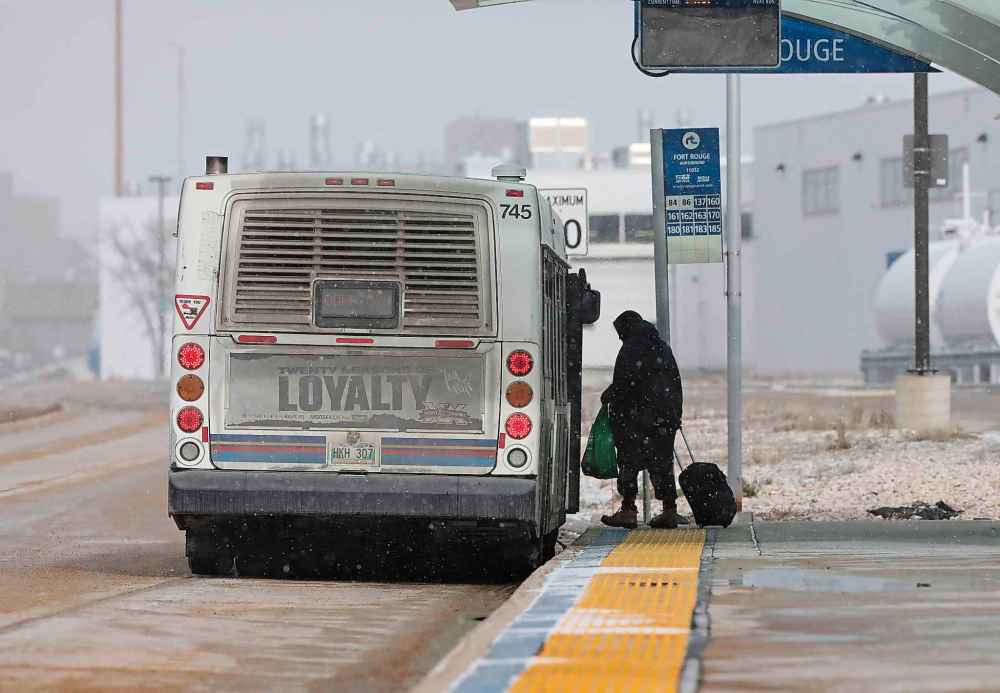Bad bus behavior got 28 people banned
Read this article for free:
or
Already have an account? Log in here »
To continue reading, please subscribe:
Monthly Digital Subscription
$1 per week for 24 weeks*
- Enjoy unlimited reading on winnipegfreepress.com
- Read the E-Edition, our digital replica newspaper
- Access News Break, our award-winning app
- Play interactive puzzles
*Billed as $4 plus GST every four weeks. Offer only available to new and qualified returning subscribers. Cancel any time.
Read unlimited articles for free today:
or
Already have an account? Log in here »
Hey there, time traveller!
This article was published 23/01/2020 (1834 days ago), so information in it may no longer be current.
A total of 28 people were banned from the city’s public transit system in 2019, most of them for violence against passengers or operators.
“It could be for any number of things,” Winnipeg Transit operations manager Randy Tonnellier said. “The most common would be more serious types of incidents like assaults.”
Transit inspectors issue banning orders, in co-ordination with Winnipeg police, to people who repeatedly fail to pay fares, vandalize property and are violent on board buses and in shelters and stations across the city. The length of the ban depends on the severity of the infraction.

Transit has been able to ban people for 20 years, Tonnellier said, but in 2017, the transit authority employed more inspectors following the murder of bus operator Irvine Jubal Fraser.
Fraser, 58, was fatally stabbed on Feb. 14, 2017. He was working a night shift and had arrived at his last stop at the University of Manitoba when he was attacked. Brian Kyle Thomas was found guilty of second-degree murder.
Since 2017, the number of people banned by transit has also increased. Tonnellier said just two people were banned in 2016, 13 people in 2017, and 29 in 2018.
He attributes the increase in banning orders to the bolstered complement of inspectors, not an increase in incidents.
“In the last three or four years, we’ve stepped it up,” Tonnellier said. “With the release of the public transit bylaw in 2014, it sort of gave us a little more teeth to this process.
“From our perspective, it’s the factors of having more people on the street, the added ability that gives us to write tickets, as well as the public transit bylaw being enacted as well.”
Enforcing the ban is a challenge for operators, Amalgamated Transit Union 1505 vice-president James Van Gerwen said, and people who have been banned in the past may go unnoticed.
Transit operators are notified when a person is banned and are provided with their photo and description. If a banned individual boards a bus, operators are expected to recognize them, carry on their route, and discreetly alert the control centre. A transit inspector will meet the operator along the route, assesses the situation, and notify police.
“We carry 170,000 people around every day, trying to recognize 29 people out of them is very difficult unless you were driver who was involved in that,” said Van Gerwen.

Last year, inspectors responded to 28 calls of a banned person on transit property. In those cases, the person was on scene when an inspector arrived.
The city has issued a request for proposals to study and recommend a new security model for Winnipeg Transit, which could include expanded powers for transit inspectors.
Van Gerwen said he’d like to see other methods of enforcement brought online or changes to policy, so the responsibility to recognize banned individuals doesn’t lie solely with operators.
“The supervisors and the drivers are on the same page, we’re all working together, and we’d both like to find a solution to this,” Van Gerwen said. “In this situation, I would not want to put my fellow brother supervisors in harm’s way by enforcing it.
“They have a tough enough job, until they get more powers I would not want to put them in harm’s way.”
danielle.dasilva@freepress.mb.ca

Our newsroom depends on a growing audience of readers to power our journalism. If you are not a paid reader, please consider becoming a subscriber.
Our newsroom depends on its audience of readers to power our journalism. Thank you for your support.







